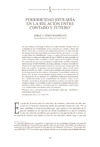Please use this identifier to cite or link to this item:
https://accedacris.ulpgc.es/jspui/handle/10553/77000
| DC Field | Value | Language |
|---|---|---|
| dc.contributor.author | Pérez Rodríguez, Jorge Vicente | en_US |
| dc.date.accessioned | 2020-12-27T17:13:47Z | - |
| dc.date.available | 2020-12-27T17:13:47Z | - |
| dc.date.issued | 2005 | en_US |
| dc.identifier.issn | 1133-455X | en_US |
| dc.identifier.other | WoS | - |
| dc.identifier.uri | https://accedacris.ulpgc.es/handle/10553/77000 | - |
| dc.description.abstract | In this paper we study the effect of the intraday periodicity on the return volatilities in the stock market and stock index futures market on Ibex35. We estimate a periodic component for each market by using the Fourier flexible functional form, and then we use this component to filter returns. The effect of the periodicity is analyzed from fitting standard GARCH models to return series and from modelling the lead-lag relationship between both markets by using a vector error correction model with GARCH-BEKK errors changing over time, taking into account infrequent trading. Our data set consists of the Ibex35 intraday closing prices from January to November 2000, using sampling intervals of ten minutes. In general, the results indicate two facts. Firstly, intraday periodicity affects the estimated coefficients in the standard GARCH and multivariate volatility models. Secondly, the periodic patterns do not affect the lead-lag relationship between both markets, in the sense that we always observe causality in both directions and we always reject that volatilities are equal in both markets. | en_US |
| dc.description.abstract | En este trabajo se investiga el efecto de la periodicidad intradía sobre lavolatilidad de las rentabilidades de los mercados de contado y futuro del Ibex35. Para ello, se modeliza el componente periódico de cada mercado de manera determinista mediante una forma flexible de Fourier, y se utiliza para filtrar las rentabilidades. Luego, se analiza el efecto de la periodicidad sobre la varianza condicional de tipo GARCH de cada mercado, así como la relación entre el contado y futuro a través de un modelo vectorialde corrección de error con covarianzas condicionales variables temporalmente de tipo GARCH-BEKK, en el que, además, se tienen en cuenta los efectos de la negociación infrecuente de las acciones que forman parte del índice de contado. El periodo muestral analizado abarca desde enero hasta noviembre de 2000, y la frecuencia intradía corresponde a intervalos de negociación de diez minutos. En general, los resultados indican doshechos. Por un lado, la periodicidad intradía afecta a las estimaciones de los coeficientes de los modelos de volatilidad condicional uniecuacionales y multiecuacionales de las rentabilidades de contado y futuro. Y, po rotro lado, la existencia de patrones periódicos no afecta a la relación entre contado y futuro, en el sentido de que se mantiene la transmisión de información en doble sentido y se rechaza que las volatilidades condicionales y no condicionales sean iguales entre los mercados. | en_US |
| dc.language | spa | en_US |
| dc.relation.ispartof | Revista de Economia Aplicada | en_US |
| dc.source | Revista de Economía Aplicada [ISSN 1133-455X], v. 13 (38), p. 65-94, (Otoño 2005) | en_US |
| dc.subject | 530904 Estructura del mercado | en_US |
| dc.subject.other | Microestructura | en_US |
| dc.subject.other | Periodicidad | en_US |
| dc.subject.other | Liderazgo | en_US |
| dc.subject.other | Volatilidad y correlación condicional | en_US |
| dc.subject.other | Microstructure | en_US |
| dc.subject.other | Periodicity | en_US |
| dc.subject.other | Lead-Lag Relationship | en_US |
| dc.subject.other | Conditional Volatility And Correlation | en_US |
| dc.title | Periodicidad intradía en la relación entre contado y futuro | en_US |
| dc.title.alternative | Intraday periodicity in the relationship between the stock and stock index futures markets | en_US |
| dc.type | info:eu-repo/semantics/Article | en_US |
| dc.type | Article | en_US |
| dc.identifier.isi | 000239277300003 | - |
| dc.description.lastpage | 94 | en_US |
| dc.identifier.issue | 38 | - |
| dc.description.firstpage | 65 | en_US |
| dc.relation.volume | 13 | en_US |
| dc.investigacion | Ciencias Sociales y Jurídicas | en_US |
| dc.type2 | Artículo | en_US |
| dc.contributor.daisngid | 1615612 | - |
| dc.description.notas | Clasificación JEL: C22, C45, C52 | en_US |
| dc.description.numberofpages | 30 | en_US |
| dc.utils.revision | Sí | en_US |
| dc.contributor.wosstandard | WOS:Perez-Rodriguez, JV | - |
| dc.date.coverdate | Otoño 2005 | en_US |
| dc.identifier.ulpgc | Sí | en_US |
| dc.description.ssci | SSCI | |
| item.grantfulltext | open | - |
| item.fulltext | Con texto completo | - |
| crisitem.author.dept | GIR Finanzas Cuantitativas y Computacionales | - |
| crisitem.author.dept | Departamento de Métodos Cuantitativos en Economía y Gestión | - |
| crisitem.author.orcid | 0000-0002-6738-9191 | - |
| crisitem.author.parentorg | Departamento de Métodos Cuantitativos en Economía y Gestión | - |
| crisitem.author.fullName | Pérez Rodríguez, Jorge Vicente | - |
| Appears in Collections: | Artículos | |
Page view(s)
56
checked on Jan 10, 2026
Download(s)
9
checked on Jan 10, 2026
Google ScholarTM
Check
Share
Export metadata
Items in accedaCRIS are protected by copyright, with all rights reserved, unless otherwise indicated.
